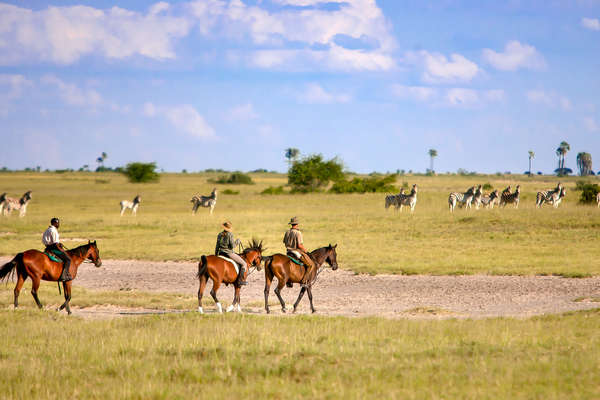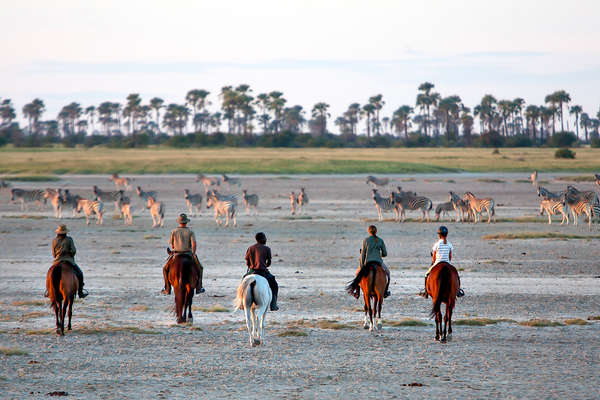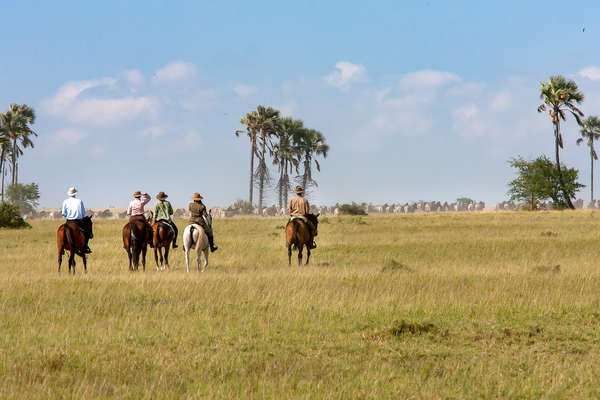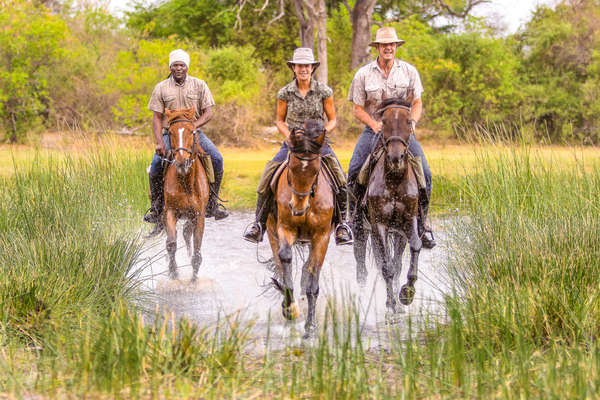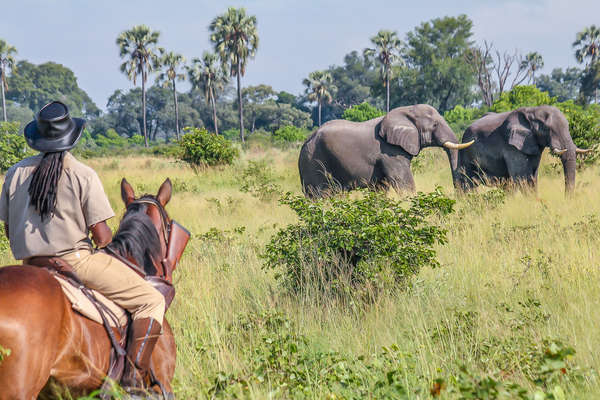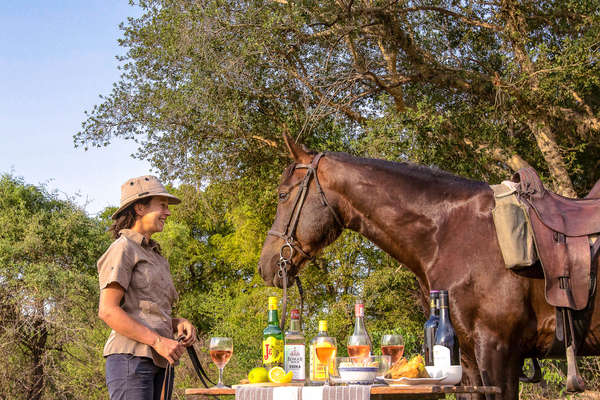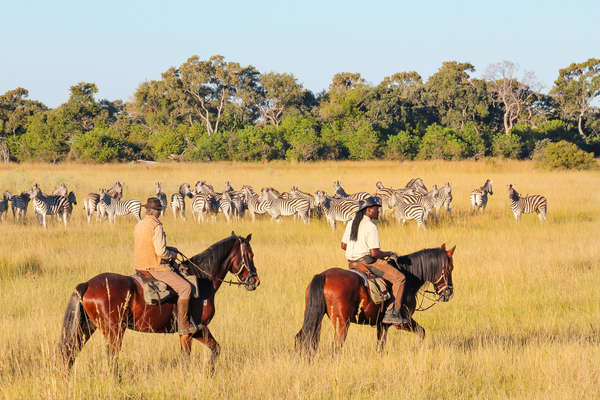Comfort
The first five nights are spent at Cha Cha Metsi, a permanent camp in the Okavango Delta. Cha Cha Metsi sleeps only 12 guests and overlooks the permanent waters of the stunning Gama Tau Lagoon – the gathering place of the lions – and part of the Santantadibe River. Personally decorated by Marieke with a collection of their family’s antique furniture it feels like you are being welcomed warmly into their own home. You will stay in one of the six safari tents. All tents are on raised platforms, with plenty of standing room and made-up stretcher beds. All tents have their own private bathroom with running hot water and proper loo. Limited WiFi in the reception area.
The following three nights are at Camp Kalahari. Camp Kalahari has 10 spacious Meru tents : 7 Twin tents, 2 Double tents and 1 Family tent consisting of 2 adjacent tents, accommodating 2 guests in each with an inter-leading bathroom. All tents have en-suite outdoor bathrooms, flush loos, hot and cold running water, along with comfy beds, fresh cotton sheets, stripy African blankets and hot water bottles in winter. A common space with library, living/dining area and a swimming pool for those hot Kalahari days.
A laundry service is included. There are camera charging facilities in the camp and limited WiFi.
Meals
Breakfast has sweet and savoury options, tea, coffee and juice.
Cold lunch buffet (salads, cold meat, fruit and cheese).
Dinner are three course meals including a starter, fish or meat main, and something sweet or fruit for dessert.
Mineral water provided, as well as beer, spirits and local wines.
Climate
The months of October to March are the hottest of the year, with temperatures varying between 15 and 37°c.
The Okavango Delta is a seasonal flood plain and so different times of the year offer different experiences - each magical in its own way. The seasons in southern Africa are the following December/January is mid-summer with high temperatures and the chance of dramatic thunderstorms, whereas July/August is mid-winter when temperatures are lower and there is little chance of rain. The water level in the Delta depend on the rainfall in Angola and the floods usually arrive around April/May and recede around September/October, but this varies every year and is difficult to predict.
In the Kalahari Desert, precipitation, is highly variable. Most of the rain comes as summer thunderstorms, with great variation from place to place and from year to year. Winters are extremely dry: humidity is very low, and no rain falls for six to eight months.
Great ranges in both diurnal and seasonal temperatures are usual. During the summer temperatures often reach 43°C but can drop to around 20° during the night; temperatures on winter nights may go as low as -12 °C.
Tips
Tips are usually between 20-25 USD per rider/ per day for the whole local team which will then be shared equally.
- Guide: US$ 10 per day per guest
- Camp Staff (including back up rider): US$ 10 per day per guest
- Community Staff (Delta only): US$ 2 per day per guest
Packing list
Luggage for local charter flights and helicopter flights is limited to 20kg per person in soft bags including hand luggage, riding kit and camera equipment. This is strictly enforced by all charter companies for safety reasons.
Our Recommendations
- Wherever possible you should wear neutral colours, such as beige, brown or natural bush colours for riding as bright colours, such as red, yellow or white can startle the wildlife and they will see you long before you've seen them
- You must bring a headtorch or small torch for moving around camp at night.
- There is no electricity at Camp, a solar charging bank could be a useful item to charge camera batteries
Head
- A riding helmet: it is seriously recommended and often mandatory. Manufacturers (GPA, HKM, LAS Helmets, Lamicell, Troxel, Equithème...) offer today ventilated, solid and light riding helmets, pleasant in all latitudes. There are also protective shells to put under your hat (Ranch & Rider, Lexington Safety Products) or western helmet hats (Troxel).
- Cap or hat for the sun (essential)
- A bandana or Buff scarf to protect yourself from dust, sun and sometimes insects.
- A pair of high protection sunglasses.
Upper body
- 3 to 4 cotton polo shirts or long sleeve shirts (protection against the sun and mosquitoes)
- 2 short-sleeved T-shirts
- 1 or 2 spare shirts for the evening.
- 1 light fleece or equivalent. (from September to June)
- 1 warm fleece or equivalent (from June to September during the austral winter).
- 1 warm or light windproof jacket depending on the season. It is very practical on horseback to wear a jacket with many pockets to put your little rider's gear. Rain is more likely Oct-April, but in the Delta you may appreciate a waterproof jacket for splashy canters May-September
Legs
- 1-2 riding breeches
- 1 pair of pants (jeans, cloth, or equivalent)
- For comfort, cotton or synthetic non-irritating underwear is preferred, and sometimes sheepskin for the saddle.
- 1 bathing suit.
- 1 pair of shorts or 1 pair of Bermuda shorts
Hands and Feet
- Light hiking shoes or riding boots and mini chaps. We recommend short boots with half . We don't recommend taking your favourite long leather boots in case they get damaged. During the flood season you may wish to take a second pair so that you aren't putting wet boots on.
- 1 pair of light shoes for the evening
- Several pairs of socks.
- 1 pair of gloves to protect from the sun and avoid blisters, which must be warmer from June to September during the southern winter.
Other useful items
- Swimsuit
- Binoculars for viewing game
- Camera and high capacity memory card. Spare battery
- Bumbag for carrying your camera and small items whilst riding
- Waterproof pouches if you want to bring your camera or phone with you whilst riding
In your luggage
- Any liquids, such as shampoo, moisturiser, deodorant unless they are less than 100ml and all bottles can fit in a small, clear, plastic ziplock bag. Some toiletries are provided by the camp so you can pack lighter.
In your hand luggage
- Any valuables, such as your camera, ipod, ipad etc.
- Your riding hat
Medical kit
- As a precautionary measure, please indicate any allergies to medication in your first aid kit:
- Personal medication
- Aspirin or doliprane
- Anti diarrhea medication
- Vitamin C
- Sunscreen with strong protection for lips and skin
- Eye drops
- Moisturizing cream
- A roll of plaster
- 10 cm wide elastic adhesive bandage
- A box of adhesive bandages
- Ready-to-use disinfectant packets
- 1 broad spectrum antibiotic
- Mosquito repellent sprays for the skin and for the tissues
Additional information
- We recommend travelling in your riding boots and carrying your hat and some riding clothes in your hand luggage - then if your luggage goes astray you are still able to ride!
- If you lose your documents, we advise you to keep a copy of your passport in a different place from the originals.





